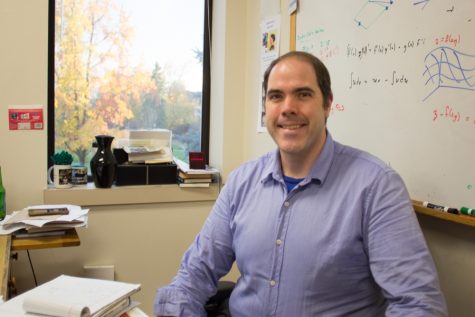Staying sober at Whitman
November 5, 2019
On Friday, Oct. 25, Professor of Geology Pat Spencer led a Continuing the Conversation discussion about some of the challenges accompanying addiction and sobriety. Spencer is a co-founder of the Sober @ Whitman group that met up until this semester.
At the talk, Spencer touched upon his own journey to sobriety from alcohol addiction, as well as the stigma and misconceptions surrounding addiction.
Spencer and a former student founded the group Sober @ Whitman in 2013 as a way for students, faculty, staff and alumni to meet in a confidential setting and support each other’s relationships with addiction.
“It was a way to get like-minded individuals with similar issues together and just talk about it and tell our stories to each other and talk about the challenges that we face on a semi-regular basis as a result of being in recovery in a society in which alcohol is a focal point of a lot of things that happen,” Spencer said.
Spencer explains that he has been sober for the past 35 years.
“I kind of wear it as a badge of honor that I seem to have beaten it at least for 35 years and still day-to-day. I still, after all these 35 years, consider it to be probably the most important change ever in my life — to go from drunk one day to sober the next day and never to drink again,” Spencer said. “I’m in recovery, and I know statistically what happens nationwide with alcoholism, and there’s a significant chance that a lot of people are affected by it.”
In fact, according to the Addiction Center, “almost 21 million Americans have at least one addiction, yet only 10% of them receive treatment.”
Sober @ Whitman discussed a broad range of addictions, including substance abuse and behavioral addictions.
“There’s always what’s called a drug of choice — mine was alcohol, [for] other people it might be coke or marijuana or a variety of different things that can draw you in and snag you,” Spencer said.
A senior computer science and math major who came to Whitman in 2015 was a member of the group as a result of his video game addiction.
“I did have a therapist in town where I attended one-on-one classic counseling sessions, but the group was also very helpful because I could talk about experiences that the other students and faculty in the group would understand more directly,” he said. “Even if different members of the group [had] different ‘types’ of addiction, there [were] still a lot of similarities across the board and it really is a, surprisingly so, shared experience.”
Sober @ Whitman is on hold this semester for a number of reasons, including not enough members regularly attending the meetings. The anonymous student cited a number of factors that may have contributed to an apparent lack of demand.
“Is it just that nobody here has any addictions? That’s kind of hard to believe. It may be that students don’t know that this resource exists, it might be that some students know the resource exists but are not willing to be honest with themselves about their own addictions, or a combination of all of the above, that’s usually the case,” the student said. “I would definitely attend if someone would want to lead the group, I just don’t feel comfortable trying to lead something like that by myself, I would rather a faculty member do it.”
The student has been sober for roughly four years now, having not played video games during that time.
“Being sober and living a sober lifestyle is still a state of unstable equilibrium because even if you have 30 years of sobriety, one bad event–having someone you care about dying or losing a job–some big event that really rattles up your life can still be enough to really push you over the edge,” he said.







